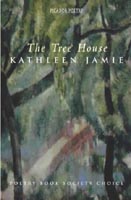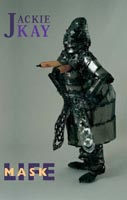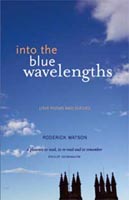Jackie Kay
Poems for Readers
These recent collections from three established Scottish poets, each with their own unmistakeably distinctive voice, will I hope give some comfort to poetry publisher Neil Astley (of Bloodaxe Books) who argued in his StAnza lecture at the 2005 St Andrew’s Poetry Festival, that most poetry in Britain today is published for poets and academics, not for readers, and attacked the self-regarding poetry establishment – including many publishers and reviewers – of being too narrowly based, male dominated, white Anglocentric and skewed by vested interests and factions. As a poor white male myself, with many interests but none of them vested, I nevertheless took heart from these three recent collections, every poem in which is a celebration in its own way. All is not rotten in the state of poetry.
 Kathleen Jamie’s The Tree House, her fourth collection, took the Forward Prize for best collection of 2004 and was the fruit of an SAC Creative Scotland Award made to her the previous year. Consisting of just under 40 new poems, all of them short, and most no longer than one page, this collection focuses on the natural world and what perhaps should be our place in it. Though these are maybe poems in miniature, none are minimalist or fleetingly impressionistic; small and beautifully crafted, each is complete in itself.
Kathleen Jamie’s The Tree House, her fourth collection, took the Forward Prize for best collection of 2004 and was the fruit of an SAC Creative Scotland Award made to her the previous year. Consisting of just under 40 new poems, all of them short, and most no longer than one page, this collection focuses on the natural world and what perhaps should be our place in it. Though these are maybe poems in miniature, none are minimalist or fleetingly impressionistic; small and beautifully crafted, each is complete in itself.
In ‘The Wishing Tree’, in the space of some dozen simple couplets, Jamie pits hope against despair, placing her Wishing Tree ‘neither in the wilderness nor fairyland/but in the fold/of a green hill.’ Humans come and present the Tree with money, thoughtlessly thrusting coins into its bark in the hope of achieving their desires. Yet despite this assault, ‘though I’m poisoned/choking on the small change/of human hope,/daily beaten into me’ any bitterness is vanquished by the certainty of the Tree’s renewal: ‘look: I am still alive -/in fact, in bud.’ A small but necessary triumph for hope.
The greater part of Jamie’s poems in her new collection are attuned to nature and to the natural world: poems about Alders, Frogs, Swallows, Pipistrelles, Daisies, Water Lilies, though occasionally a human intrudes in such poems as ‘Reliquary’, ‘Hoard’ and ‘The Glass-hulled Boat’. In another sea-piece, ‘The Blue Boat’, Jamie is at her most ‘neo-metaphysical’: ‘How late the daylight edges/toward the northern night/as though journeying /in a blue boat, gilded in mussel-shell/with, slung from its mast, a lantern/like our old idea of the soul.’
Kathleen Jamie’s writing is the essence of clarity and precision; it is beautifully and meticulously crafted and speaks directly and with great simplicity. That is perhaps the genius of her exquisite work. Also included in this collection are two versions ‘eftir H
ölderlin’, turnit intil Scots.
 Moving from an examination of the exterior natural world to the interior and personal, in Life Mask, a Poetry Book Society Recommendation, Jackie Kay examines the vexatious question of identity and the many-layered personae we all adopt. Through and in her work, Kay attempts to come closer to writing about the authentic self.
Moving from an examination of the exterior natural world to the interior and personal, in Life Mask, a Poetry Book Society Recommendation, Jackie Kay examines the vexatious question of identity and the many-layered personae we all adopt. Through and in her work, Kay attempts to come closer to writing about the authentic self.
While many of the poems here are concerned with mask as metaphor, masks that hide, masks that cover, masks that change the wearer, some are also inspired by the actual processes involved in the making of a life-mask, which Kay herself experienced when she sat for a sculptor who cast her head in bronze. In Life Mask, Kay lets some of her masks slip, and in so doing writes eloquently and authentically about her own vulnerability and her experience of loss and change occasioned by the ending of her long-term relationship with the poet Carol Ann Duffy.
 In the epigraph to his first collection in over twenty years, into the blue wavelengths, Roderick Watson writes ‘perhaps all poems are love poems – and elegies as well.’ Indeed, this collection consists of both, each poem describing love or loss, but every one a celebration too, whether of the private moments such as his wife’s pregnancy or his baby daughter’s earliest steps, or his personal recollections of fellow-poets Robert Garioch, Norman MacCaig, Hugh MacDiarmid and Syndey Goodsir Smith, or his more general reflections on life and art. In ‘A Chinese Moment by the Duckpond’, offered to Norman MacCaig on his eightieth birthday, ‘mandarins pose/ on the edge of the pond … one of them lets down/his little pink feet/to paddle in the crystal stream./Hardly noticed/on the dun bank/a lady rests among the group/…watched but not watched/by intellectuals at court./Above it all below it all/fish swim in the thoughtful depths./…The ducks. The fish. The golden air./Shallowness. Depth. Flow.’ ‘Panta re’ – nothing endures but change.
In the epigraph to his first collection in over twenty years, into the blue wavelengths, Roderick Watson writes ‘perhaps all poems are love poems – and elegies as well.’ Indeed, this collection consists of both, each poem describing love or loss, but every one a celebration too, whether of the private moments such as his wife’s pregnancy or his baby daughter’s earliest steps, or his personal recollections of fellow-poets Robert Garioch, Norman MacCaig, Hugh MacDiarmid and Syndey Goodsir Smith, or his more general reflections on life and art. In ‘A Chinese Moment by the Duckpond’, offered to Norman MacCaig on his eightieth birthday, ‘mandarins pose/ on the edge of the pond … one of them lets down/his little pink feet/to paddle in the crystal stream./Hardly noticed/on the dun bank/a lady rests among the group/…watched but not watched/by intellectuals at court./Above it all below it all/fish swim in the thoughtful depths./…The ducks. The fish. The golden air./Shallowness. Depth. Flow.’ ‘Panta re’ – nothing endures but change.
Kathleen Jamie, The Tree House, Picador Poetry, ISBN 0330433326 (£8.99); Jackie Kay, Life Mask, Bloodaxe Books, ISBN 185224691 (£7.95); Roderick Watson, into the blue wavelengths, Luath Press, 1842820753 (£8.99)
Copyright Michael Lister 2005

Comments